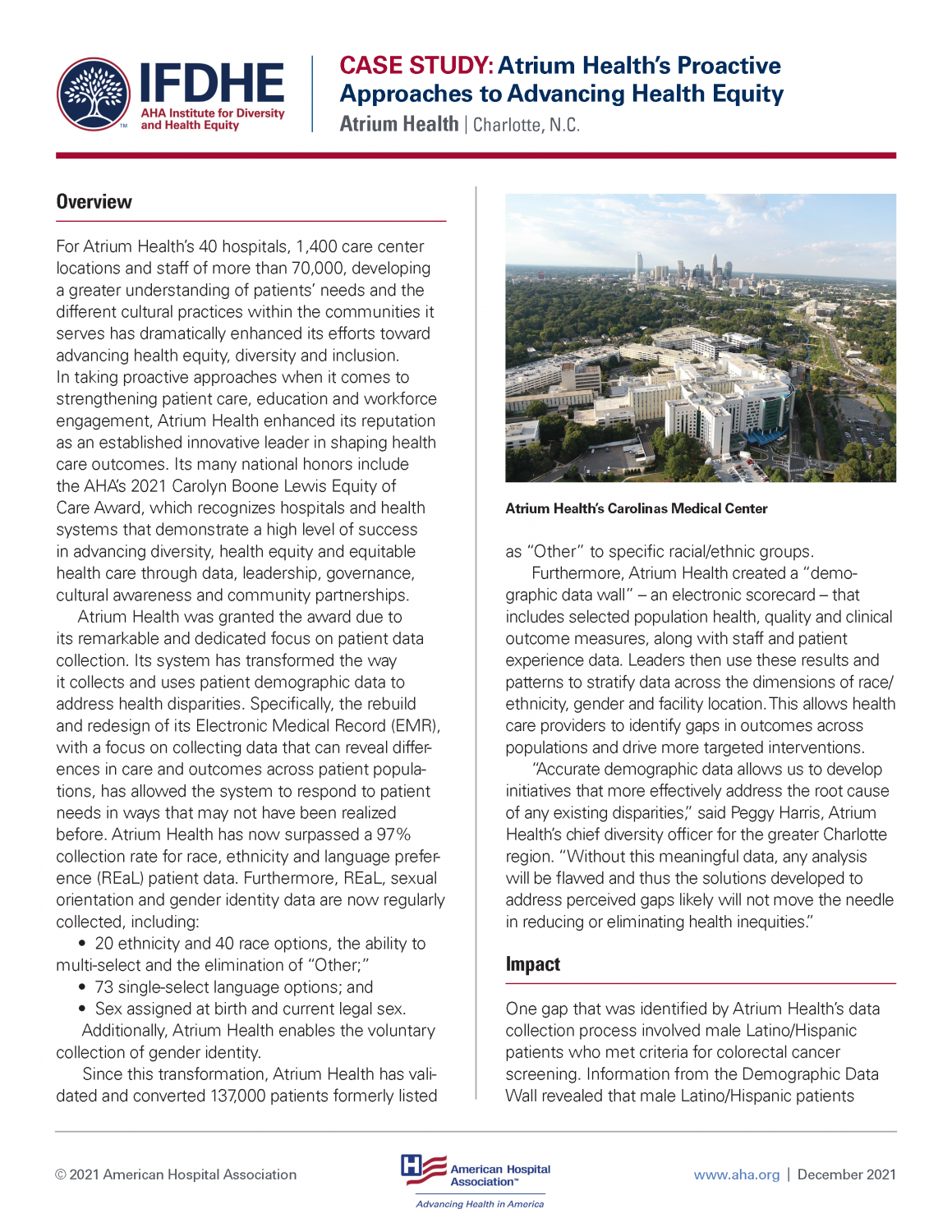Atrium Health’s Proactive Approaches to Advancing Health Equity
Charlotte, N.C.
IFDHE Case Study
Overview
For Atrium Health’s 40 hospitals, 1,400 care center locations and staff of more than 70,000, developing a greater understanding of patients’ needs and the different cultural practices within the communities it serves has dramatically enhanced its efforts toward advancing health equity, diversity and inclusion. In taking proactive approaches when it comes to strengthening patient care, education and workforce engagement, Atrium Health enhanced its reputation as an established innovative leader in shaping health care outcomes. Its many national honors include the AHA’s 2021 Carolyn Boone Lewis Equity of Care Award, which recognizes hospitals and health systems that demonstrate a high level of success in advancing diversity, health equity and equitable health care through data, leadership, governance, cultural awareness and community partnerships.
Atrium Health was granted the award due to its remarkable and dedicated focus on patient data collection. Its system has transformed the way it collects and uses patient demographic data to address health disparities. Specifically, the rebuild and redesign of its Electronic Medical Record (EMR), with a focus on collecting data that can reveal differences in care and outcomes across patient populations, has allowed the system to respond to patient needs in ways that may not have been realized before. Atrium Health has now surpassed a 97% collection rate for race, ethnicity and language preference (REaL) patient data. Furthermore, REaL, sexual orientation and gender identity data are now regularly collected, including:
- 20 ethnicity and 40 race options, the ability to multi-select and the elimination of “Other;”
- 73 single-select language options; and
- Sex assigned at birth and current legal sex.
Additionally, Atrium Health enables the voluntary collection of gender identity.
Since this transformation, Atrium Health has validated and converted 137,000 patients formerly listed as “Other” to specific racial/ethnic groups.

Atrium Health’s Carolinas Medical Center, Charlotte N.C.
Furthermore, Atrium Health created a “demographic data wall” – an electronic scorecard – that includes selected population health, quality and clinical outcome measures, along with staff and patient experience data. Leaders then use these results and patterns to stratify data across the dimensions of race/ ethnicity, gender and facility location. This allows health care providers to identify gaps in outcomes across populations and drive more targeted interventions.
“Accurate demographic data allows us to develop initiatives that more effectively address the root cause of any existing disparities,” said Peggy Harris, Atrium Health’s chief diversity officer for the greater Charlotte region. “Without this meaningful data, any analysis will be flawed and thus the solutions developed to address perceived gaps likely will not move the needle in reducing or eliminating health inequities.”
Impact
One gap that was identified by Atrium Health’s data collection process involved male Latino/Hispanic patients who met criteria for colorectal cancer screening. Information from the Demographic Data Wall revealed that male Latino/Hispanic patients were being screened at lower rates than their white counterparts. This finding prompted Atrium Health to develop its “For All” Health Equity Colorectal Cancer Screening Goal, among other initiatives, to work on closing the gap. They also launched a phone-call campaign to contact and educate Hispanic/Latino male patients about colorectal cancer screening, a media campaign to disseminate educational articles and information in a local Spanish-language newspaper as well as targeted interventions at primary care practices and at the community level. With these combined initiatives in place, Atrium Health was able to make a significant impact in early identification of colorectal cancer among Hispanic/ Latino males and improve screening rates. Over the course of two years, more than 200 individuals in the target population scheduled necessary colorectal cancer screenings.
Atrium Health’s mission to broaden its overall community outreach led to the launch of several awareness initiatives such as COVID-19 prevention education, testing and treatment practices. Their strategy includes a strong focus on reaching out to those whose primary language is not English. Atrium Health’s health care interpreters currently supply translation/interpreting services in more than 200 languages.
In mid-March 2020, Atrium Health set up fixed testing sites across their service area. Around the same time, Atrium Health also created a Multicultural Communications Taskforce - to provide culturally responsive communications and address COVID-19 misinformation in minority communities (e.g., immunity, home remedies, threat to immigration status, etc.).
The effort was initiated following staff suggestions and other sources of input for making data collection improvements.
Furthermore, Atrium Health built its COVID-19 Electronic Dashboard, to provide updated analytics every two hours — including the number of tests, positives, and mortality, stratified by race/ethnicity, age, and test location. A COVID-19 Geographic Information System (GIS) map was also created, which includes social factors affecting geographical spread, such as population density, median income, population concentration, and nearby church and school locations.
By the end of March 2020, Atrium Health had identified gaps in testing for communities of color and found that the majority of African Americans were being tested in the Emergency Department. A multi-disciplinary COVID-19 Disparities Taskforce was formed to address the identified testing disparities. Atrium Health launched its innovative testing model that integrates actionable GIS data with mobile care units (MCUs). The MCU model targets virus hotspots in underserved neighborhoods and breaks down barriers to access in economically challenged Black, Latino, and Native American communities.
To ensure equitable vaccine distribution, the Atrium Health led collaborative, Community Immunity For All, was formed to vaccinate underserved communities and those most disproportionately affected by COVID-19. To address the disparities in these same communities, Atrium Health expanded its MCU model to include vaccine distribution. The mobile outreach effort has now served around 100,000 community members at more than 100 sites across nine area counties.

Atrium Health’s Levine Children’s Hospital
Collection of sexual orientation and gender identity (SOGI) data also has generated positive developments for Atrium Health’s transgender patient population. Better collection of SOGI data led to the development and deployment of a transgender education program for providers and the opening of a new Gender Identity Clinic at Atrium Health’s Levine Children’s Hospital.
Lessons Learned
Atrium Health encountered many barriers along its journey to transform how it collects patient demographic data. Among these challenges was ensuring intake staff did not make snap judgments based on a patient’s appearance, but instead started the process with a more respectful approach by asking each person which race/ethnicity they most closely identified. Through its Office of Diversity & Inclusion, Atrium Health strives to educate its care providers on the impact of unconscious bias and works toward mitigating such biases in everyday practices.
Future Goals
“Atrium Health seeks to ensure our teammates provide culturally competent care. We continue to increase the cultural competency of our teammates through our portfolio of educational offerings,” Harris said. “Increasing the cultural competency of our workforce means that our clinicians and patientfacing staff, will be better able to communicate and help patients of different ethic and socioeconomic backgrounds. Our goal is to reduce biases and increase the understanding of the customs and expectations that are tied to differing cultures.”
When it comes to building new community partnerships, strengthening current partnerships and expanding its partnership network, Atrium Health offers these strategic guideposts as advice for health care organizations looking to pursue similar goals:
- Trust is key. Make it your priority to build and foster trusting relationships with internal and external stakeholders, as well as community and patient groups.
- Be proactive. Atrium Health actively looks to identify and build relationships with community leaders and organizations in certain community groups/populations. Leveraging these relationships to address community-specific needs is vital for coordinating responses and actions.
- A diverse workforce is an asset. Oftentimes, a healthcare system is one of the largest employers in its service area. We found that our teammates are willing to, and will, advocate for access in their communities.
- Follow the data. Collect and analyze information from relevant sources (e.g., census data, GIS maps and health department data). These data can help identify areas of need and help establish meaningful relationships with community leaders who can serve as advocates.
- Re-engage connections. Ask existing partners for new opportunities to collaborate.
- Take it to the top. Expand your influence by working with local municipalities and elected officials. Engage the leadership at all levels of the organization.
Learn how Atrium Health’s board has worked to advance and support health equity strategies across its entire health care system by listening to this podcast from AHA Trustee Services.


